

HELPING HOLD DOWN COSTS
GEOFF McGREGOR
SELLING MULTIMILLION
DOLLAR PROPERTIES
MATT TOMPKINS
HELPING BUILD
ENTREPRENEURS’ PODCASTS







HELPING HOLD DOWN COSTS
GEOFF McGREGOR
SELLING MULTIMILLION
DOLLAR PROPERTIES
MATT TOMPKINS
HELPING BUILD
ENTREPRENEURS’ PODCASTS




We’re thrilled to announce the Best of B2B results in the April/May issue, highlighting the top companies in the industry. Plus, we’ve given our B2B Omaha magazine a fresh new look that’s sleek, modern, and packed with all the business insights you need.
Stay tuned for our launch party celebrating both the award winners and the new magazine design! It’s an event you won’t want to miss.
Get ready to celebrate business excellence like never before.

EXECUTIVE
CEO
Bill Sitzmann
EDITORIAL
editor-in-chief
Kim Carpenter
interim editor-in-chief
Daisy Hutzell-Rodman
associate editor
Natalie Veloso
assignment editor
Claudia Moomey
contributors
Tamsen Butler
Brandi Long-Frank
Heath Mello
Deborah Ward
Lisa Lukecart
Dwain Hebda
Kevin Coffey
Kyle Eustice
Hal Senal
INFORMATION advertising information 402.884.2000
subscribe online omahamagazine.com/ pages/subscribe

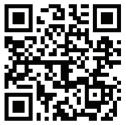
CREATIVE
creative director
Rachel Birdsall
senior graphic designer
Renee Ludwick
graphic designer II
Nickie Robinson
graphic designer I
Joey Winton
photographers
Bill Sitzmann
Sarah Lemke
Roger Humphries
Katie Anderson
SALES
executive vice president
sales & marketing
Gil Cohen
top level
revenue generator
Michelle Schrage
branding specialists
Dawn Dennis
George Idelman
Francine Flegg
Sandy Matson
contributing branding specialists
Greg Bruns
Tim McCormack
senior sales coordinator
Alicia Hollins
sales coordinator
Sandi McCormack
OPERATIONS
business manager
Kyle Fisher
ad traffic manager
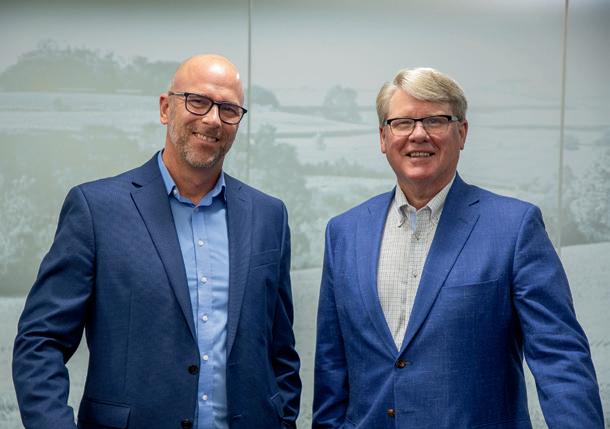
David Trouba
distribution manager
Damian Ingersoll
publisher
Todd Lemke
W hen I first heard of Megan Hale, I thought, “Wow, she’s a great woman entrepreneur.” As I learned more about how this former therapist created her Dream Money program, I became amazed here’s someone who knows what she wants and is empowering others, especially other women, to become what they want.
Thinking smaller is the idea behind Signature Performance, which is working to help streamline administrative processes and keep costs down in the health care sphere. With health care costs around $4.3 trillion annually, this is a much-welcomed business.
Geoff McGregor has spent his life assisting high net worth individuals (often businesspeople) expand their portfolios into commercial real estate with his company, McGregor Interests. The company often appeals to firsttime real estate investors with their low minimum it only takes $100,000 to start investing with McGregor.
Matt Tompkins is helping businesspeople navigate a trend with his business Two Brothers Creative. Tompkins, a former radio DJ and a comedian, knew when podcasting came on the scene several years ago that it would be the next big thing in broadcasting. The company he was working for, however, dismissed his ideas. That’s when he struck out on his own, and the resulting business has helped many businesses around the metro that want to capitalize on this marketing tool.
Elisa Davies is known as a great negotiator and relationship-builder at HDR, where she is the general counsel and senior vice president. Her legal background has served her well as she has used her human-focused leadership style.
There are so many great articles in this issue, many of them have to do with businesses that help other businesses and business leaders. I hope you will find a business within these pages that you want to work with in the future, and that you enjoy these articles.
Daisy Hutzell-Rodman is an editor at Omaha Publications.
She can be reached for story suggestions and pitches at daisy@omahapublications.com
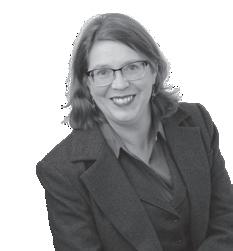
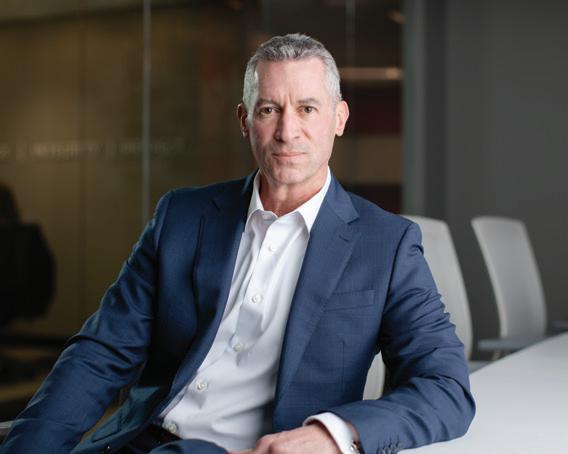


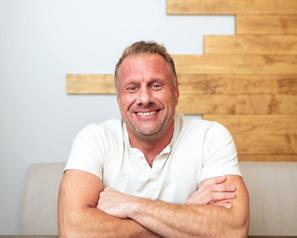

ABOUT THE COVER
Boardroom Boss. Elisa Davies, HDR’s executive VP and general counselor, leads the global legal team of more than 20 legal professionals. Story page 10
Cover photography Bill Sitzmann
Cover design Renee Ludwick
Kellogg Federal Credit Union expanded into La Vista when its headquarters was built at 96th Street and Brentwood Drive in 2020. Since then, it’s been a force for good within the community and an ardent supporter of the La Vista Community Foundation. In 2024, the foundation’s 25th year of operation, Kellogg FCU was a top supporter of the organization.
“As soon as we became part of the community, we knew it was important for us to become involved with the foundation so that La Vista would know how much being a part of their community means to us,” said Jessica Weible, member support administrator at Kellogg FCU.
Weible attributes a great deal of the philanthropic culture at the credit union to Jennifer Warnsing, who has been in the CEO role for nearly a decade. “I grew up on a farm outside of DeWitt, Nebraska, with small-town values; family, community, and giving back are engrained in me,” Warnsing said. She added that watching her parents demonstrate enthusiastic community involvement as she grew up had a big impact on her and made her want to get involved.
Weible said that Warnsing’s leadership helped cultivate a team that “genuinely cares.” The Kellogg FCU team has hosted a variety of community events over the years, including back-to-school drives, sock drives, coat drives, natural disaster collections, and toy drives to support the community. They also host shred days for the community and offer scholarships to graduating high school seniors. “Our team has also been known to personally make contributions to members going through hardships and send them anonymous gifts to assist,” Warnsing said.
The giving culture at Kellogg FCU doesn’t end with the employees members get involved in the efforts, too. It’s no surprise that members have started to feel like family to the Kellogg FCU team when they all work together to serve the La Vista community. As a result, the team gets to know the members better, and vice versa.
The community efforts of the Kellogg FCU team and members created a community within a community one where people know each other’s names and all share a common goal: to serve La Vista.
Warnsing explained that the team’s choice to support the La Vista Community Foundation was easy. They researched various nonprofit organizations and felt that the foundation had “similar values to what our credit union embodied and we wanted to be a part of that community,” she said. Those values, Warnsing enthusiastically noted, are “giving back, supporting one another, and having fun while doing it!”
Warnsing’s advice to other local financial institutions is to research potential partners to support, and to find an organization that has similar values and “just reach out. There are so many deserving organizations who would be grateful for any, and all, partnerships,” she said.
“Our goal is to be present within the community to show we are here for them,” she added. That one goal has led to a powerful partnership that has certainly benefitted the La Vista community.
To learn more, visit kellogg-fcu.org.

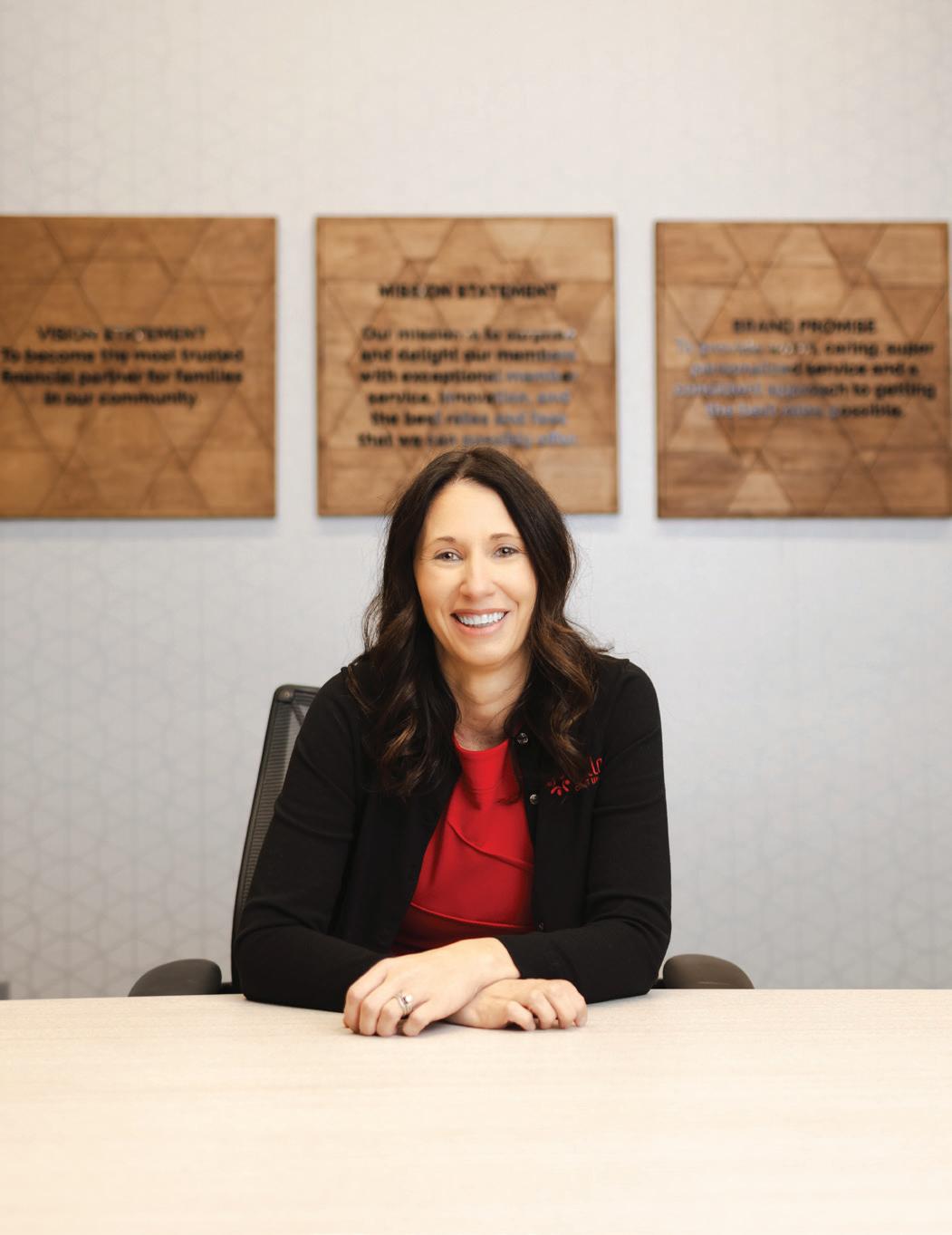
“OUR GOAL IS TO BE PRESENT WITHIN THE COMMUNITY TO SHOW WE ARE HERE FOR THEM.”
-JENNIFER WARNSING
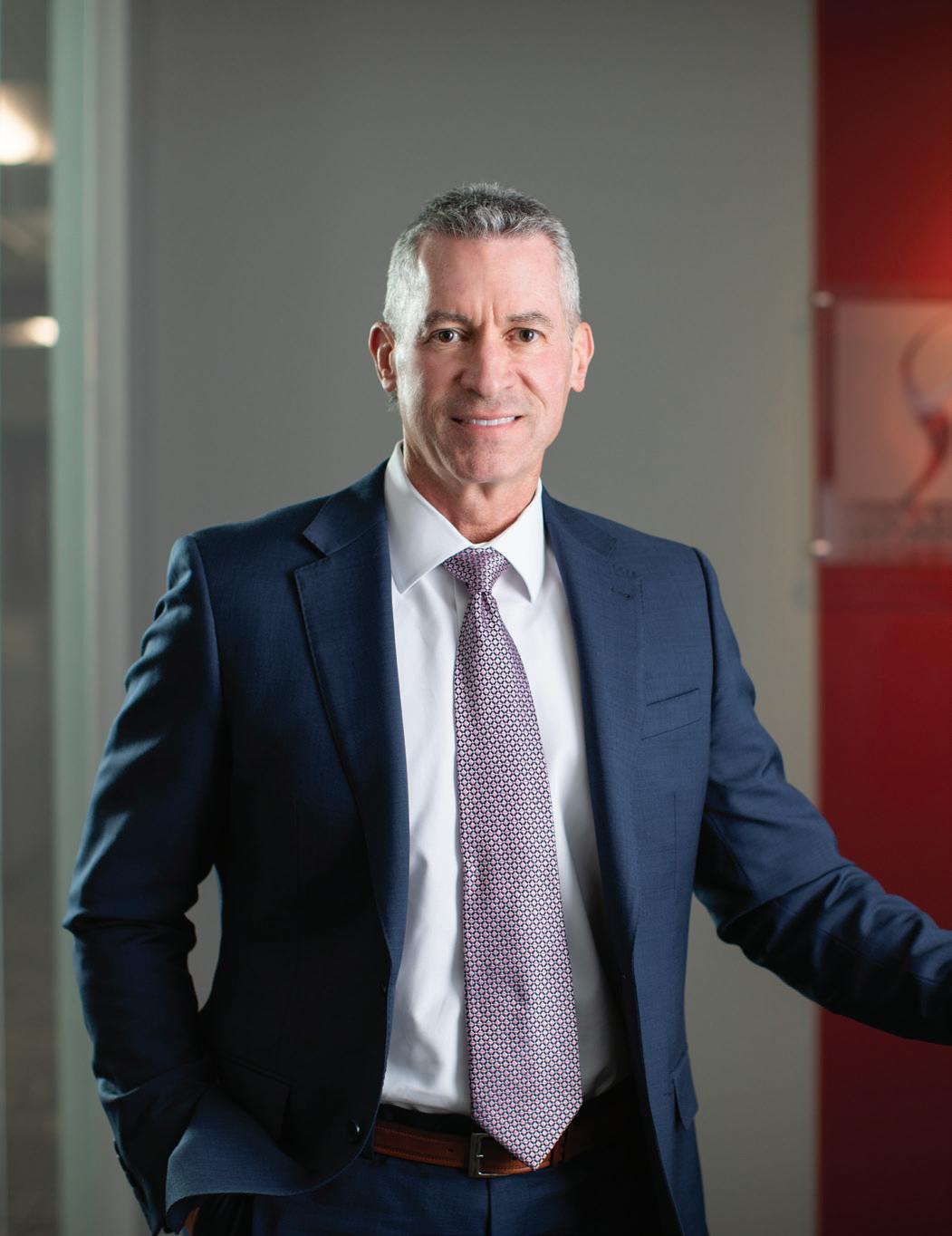

The growth in health care costs in the U.S. is staggering, making the sector an expensive and problematic proposition for individuals and families.
In 1960, per capita health care spending was $146; 20 years later, it was just shy of $1,100. Since 2015, health care spending per capita has gone from $9,880 to more than $13,000 in 2022, per Statista. The impact of escalating health care costs also bleeds over into the business sector as companies struggle to offer medical benefits to attract and retain workers.
Experts point to a variety of factors for the sharp increase, not the least of which is a dizzying array of administrative and back-office costs that are passed on to the consumer. Recognizing this fact, Signature Performance was born, offering a suite of products and services to help clients streamline administrative processes and realize cost reduction through efficiency.
“The total health care spend is about $4.3 trillion and going up annually,” said Chris Vairo, chief of staff. “Of that, about 40 to 42% of that total spend is now (for) the administrative part of health care; for every dollar, 42 cents are going just to administer claims. Twenty years ago, that was probably 15%. Our focus is driven towards helping reduce that health care administrative burden that’s taking place.”
Vairo joined Signature Performance in 2013 and in the time since has helped drive the company’s growth in the health care space. The company’s business plan and expertise has fueled it to serve more than 2,000 medical and payer organizations
in 47 states and employs 1,250 associates. He said the company has become a sought-after resource to help solve some of the trickiest and most costly administrative snarls faced by the industry.
“One, we’re providing technology, which is a claims, billing, and processing platform for the federal government. We do that for the VA today,” he said. “We also do a lot of billing, follow up, denial management, and medical coding where we’re actually an extension of our client, helping them to do the work, which ideally optimizes their cash flow.”
Vairo continued, “Thirdly is a consulting piece. We acquired a consulting firm in 2022 and in that role, we are really helping clients to identify where the opportunities are for them to really maximize reimbursement, minimize expense, and optimize systems.”
Commonly, health care clients find themselves foundering under the weight of regulatory pressure, underused yet expensive technology, and rising personnel costs, Vairo said, and Signature Performance takes a turnkey approach toward the most pervasive of these.
“WE ARE REALLY HELPING CLIENTS TO IDENTIFY WHERE THE OPPORTUNITIES ARE FOR THEM TO REALLY MAXIMIZE REIMBURSEMENT, MINIMIZE EXPENSE, AND OPTIMIZE SYSTEMS.”
-Chris Vairo

Looking for a powerful, yet cost-effective ticketing solution for your events in and around Omaha? Check out Local Stubs!
Fewer fees than eventbrite! With features:
• Customizable event web pages
• Ticket sales tracking
• Sales dashboard
• Pre-created social media posts
• Data analytics and insights
• Free mobile check-in app
• Instant access to local consumer audiences
Get started with a free demo at localstubs.com!
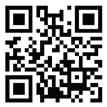

“Increased regulation creates more and more administrative burden. That doesn’t mean (regulation is) all bad, but there is a cost or expense required in order to meet them,” he said. “Technology, if used properly, can create significant efficiencies, which ideally over time would reduce that administrative burden. However, what happens, and what we often see, is our client hospitals may not utilize technology to the optimum level. They spend a lot of money for it, but they don’t use all of it.”
The company’s suite of expertise coupled with the expertise of staff Vairo, who has been in health care for 32 years, is among many other experienced associates across the company who have been hired directly from the medical field or in roles in health care administration helps Signature devise sound solutions to market challenges.
Signature Performance not only recruits for success, but also actively invests in it. The holder of multiple “Best Places to Work” awards by various local and national entities, the company seeks to empower each employee for personal growth and show them the path to advancement through its Uncommon Leadership Playbook.
“I believe everyone wants to make an impact, everyone wants to make a difference, be successful. I just don’t know too many people that don’t,” founder and CEO Allen Fredrickson said in his address to the 2023 ICAN Conference in Omaha, “but I think people are challenged with how do we become successful? How do you do it?
“So, we created what we call an Uncommon Leadership Playbook. Everyone needs to put their own fingerprints on how they march forward, but we do give them guidelines. In this playbook we have seven or eight key themes, if you will, and then there’re self-tests that they can administer on their own so they can score themselves and how they are doing. They have a sense of what success looks like and how they go about doing it, because they’re drawing upon their own great gifts.”
Now in its 20th year, Signature has expanded from its initial clientele of federal clients, specifically the Department of Defense, performing revenue cycle services for military hospitals across the country
CRITICAL ACCESS IS A DESIGNATION GIVEN TO HOSPITALS LESS THAN 25 BEDS THAT ARE SERVING A UNIQUE NEED, PRIMARILY IN RURAL AMERICA. IT’S IMPORTANT THAT WE, AS A NATION, HELP THOSE HOSPITALS SURVIVE AND IDEALLY THRIVE, BECAUSE IF THEY HAVE TO CLOSE DOWN, THEN PEOPLE IN THOSE COMMUNITIES HAVE TO DRIVE MUCH FURTHER TO RECEIVE QUALITY CARE.
-CHRIS VAIRO
and overseas. That work would eventually lead to the Veterans Administration, which helped the company flex its expertise on both the provider and payer sides of the health care revenue equation.
For as large as the company has become, Vairo said he takes the most pride in how the firm serves the smallest and most vulnerable clients, many of whom hit close to home.
“We love to work in the rural markets and the small critical access hospitals,” he said. “Critical access is a designation given to hospitals less than 25 beds that are serving a unique need, primarily in rural America. It’s important that we, as a nation, help those hospitals survive and ideally thrive, because if they have to close down, then people in those communities have to drive much further to receive quality care.
“We also work with the medium and large multihospital health care systems, and we enjoy all of that, but we really love serving that rural market. I’ll tell you, there are several that we work with that are thriving and doing well that were going to close their doors if they didn’t get something going. Without Signature, I’m fairly confident they wouldn’t be around today. That really jazzes me up to know that we’ve made that kind of an impact.”
For more information, visit signatureperformance.com.
B2B
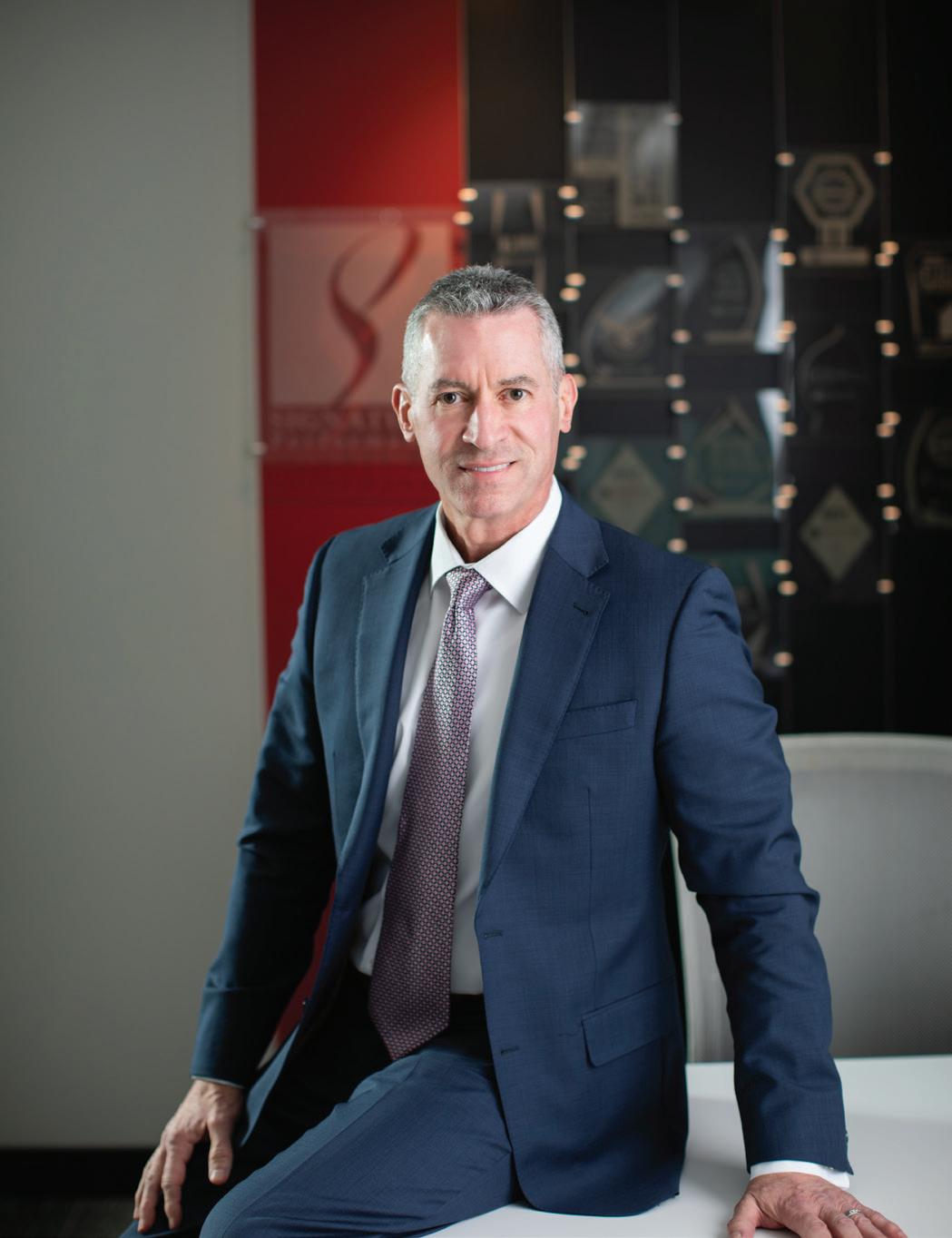
t wasn’t mapped out in advance.
Elisa Davies’ path to the executive suite at HDR Inc., the Omaha-based global architecture and engineering firm, was not the culmination of an elaborate plan.
Culminating in becoming HDR’s executive vice president and general counsel, Davies’ journey came about due to her “pioneer spirit.”
As the granddaughter of pioneers who homesteaded in western Nebraska and the daughter of entrepreneurs, Davies carries a legacy of grit and determination.
“That pioneer spirit really resonates with me,” she said. “I am driven to push boundaries, and I want to do it in a way that’s impactful.”
Her journey began in an unexpected fashion. Entering Coe College on a theater and singing scholarship, Davies thought she might be destined for the stage. Self-described as “driven by curiosity,” Davies said a history class at Coe changed everything. She fell in love with history and couldn’t get enough classes. Then one professor in particular, Rosemary Carroll, Ph.D., encouraged Davies to consider law school not to practice law, but to become a better historian.
“Law school teaches you to be critical from different perspectives,” Davies explained. “It’s about balancing history with the future, balancing analysis with experience, and balancing good judgment with emotional intelligence.”
At HDR, Davies leads the global legal team of more than 20 legal professionals. Davies’ leadership
philosophy is designed to foster teamwork by creating space for diverse strengths and viewpoints while maintaining overlapping responsibilities.
She lovingly describes them as a “big band full of unique instruments.”
“Rather than us having solos, we’re all playing together,” Davies said. “That philosophy of teamwork by design is meant to leverage all the diverse strengths and points of view and subject matter expertise, and have these overlapping tiers of responsibility so we have resilience and backup strength to rely on each other and have a safe space for peer-to-peer consultation.”
Davies came to HDR as general counsel and senior vice president in 2021. There she found a corporate culture that aligns with her values. She said the company’s employee-ownership model, in which the company is 100% owned by employees and success is shared by the people who work to create it, leads to what she calls a “culture of listening first and collaboration” among its more than 13,000 employees.
Earlier this year, Davies was promoted to executive vice president, which came as both an honor and a surprise.
Davies serves as a key legal counselor to HDR’s executive leadership team and board of directors. During board meetings, she acts as corporate secretary, writing and introducing resolutions for the board. Minutes before a recent meeting was to start, the CEO pulled her aside and asked her to add a resolution to the agenda promoting her to her current role as executive vice president. She felt
honored, of course, but she also appreciated how the company prioritized her department.
“We’re a company that wants to do things right,” she said.
While a basis in engineering, architecture, math, and physics may seem like HDR is all about following the rules “a lawyer’s dream,” Davies joked she has found the company to be extremely “fulfilling and inclusive.”
Davies’ human-focused leadership style stems from her varied professional experiences. One that stands out was when she was a new mother working at Union Pacific. Davies was invited to participate in a trip through the Tehachapi Mountains in California in a hi-rail truck, which rides along the tracks for maintenance and inspection. A nursing mother, she was concerned she would not be able to make the trip, so she reached out to the manager of track operations to arrange accommodation for breaks.
“He arranged for some old train depots that had been abandoned for the electric to be turned back on so I could take 20-minute breaks every few hours,” she recalled. “It goes to show that we can be driven and we can be human. We can ask for help, and there are plenty of really awesome, thoughtful people who will help us along the way if you just make yourself vulnerable and ask for the help that you need.”
This experience shaped her perspective. Today, she greatly appreciates the culture and workplace dynamics at HDR.
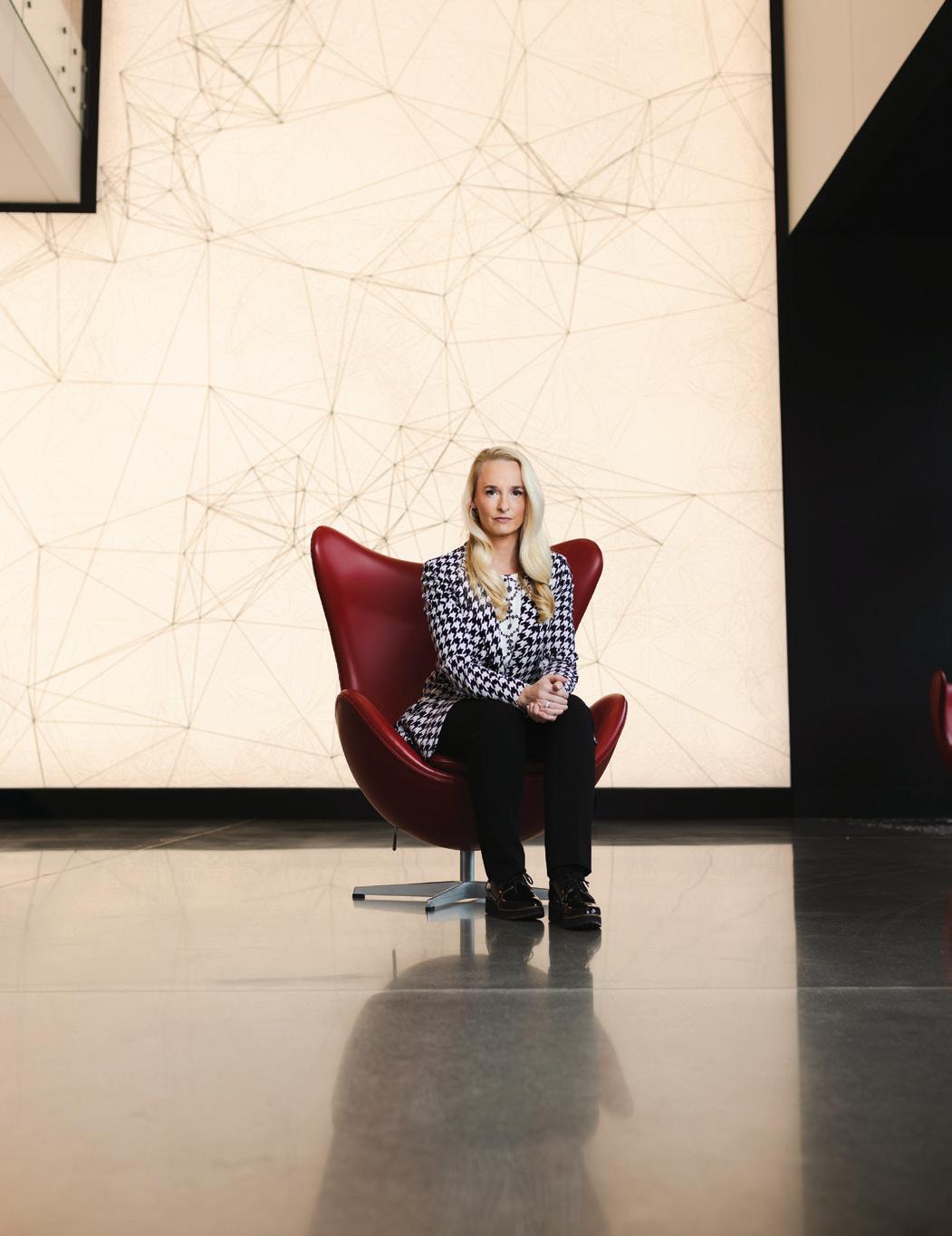
“LAW SCHOOL TEACHES YOU TO BE CRITICAL FROM DIFFERENT PERSPECTIVES. IT’S ABOUT BALANCING HISTORY WITH THE FUTURE, BALANCING ANALYSIS WITH EXPERIENCE, AND BALANCING GOOD JUDGMENT WITH EMOTIONAL INTELLIGENCE.”
-Elisa Davies
• Guaranteed Lower Fees
• Low-cost Terminals & Point of Sale Systems
• Top-rated Customer Service
• Guaranteed Lower Fees
• Guaranteed Lower Fees
• Low-cost Terminals & Point of Sale Systems
• Low-cost Terminals Point of Sale Systems
• Gift & Loyalty Card Programs
• Top-rated Customer
(Including the PinPoint Card Program)
information call 402.502.9985 or AmericanPaymentSystems.com

Local & Family Owned Business

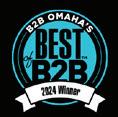
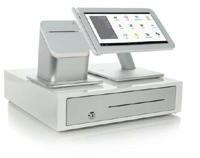
• Guaranteed Lower Fees
Customer Service Card Programs (Including the PinPoint Card Program)
• Gift & Loyalty Card (Including the PinPoint Card Program)
For more information call 402.502.9985 or visit AmericanPaymentSystems.com a Local & Family Owned Business


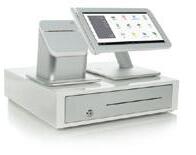
• Guaranteed Lower Fees
• Guaranteed Lower Fees
• Low-cost Terminals & Point of Sale Systems
• Low-cost Terminals & Point of Sale Systems
• Low-cost Terminals & Point of Sale Systems
• Top-rated Customer Service
• Top-rated Customer Service
For more information call 402.502.9985 or visit AmericanPaymentSystems.com a Local & Family Owned Business

• Top-rated Customer Service
• Gift & Loyalty Card Programs (Including the PinPoint Card Program)
• Gift & Loyalty Card Programs (Including the PinPoint Card Program)
• Gift & Loyalty Card Programs (Including the PinPoint Card Program)
For more information call 402.502.9985 or visit AmericanPaymentSystems.com a Local & Family Owned Business
For more information call 402.502.9985 or visit AmericanPaymentSystems.com a Local & Family Owned Business
11 years in a row Local & Family Owned
For more information call 402.502.9985 or AmericanPaymentSystems.com a Local & Family Owned Business
“People are highly respectful of each other’s professional opinion. There is this deference to other people’s points of view. It’s made up of subject matter experts,” Davies said. “I’ve really appreciated their openness to amplifying emotional intelligence and harnessing the power of things that are softer than logic and softer than math and softer than physics.”
Before joining HDR, Davies left her mark on one of Omaha’s most treasured traditions.
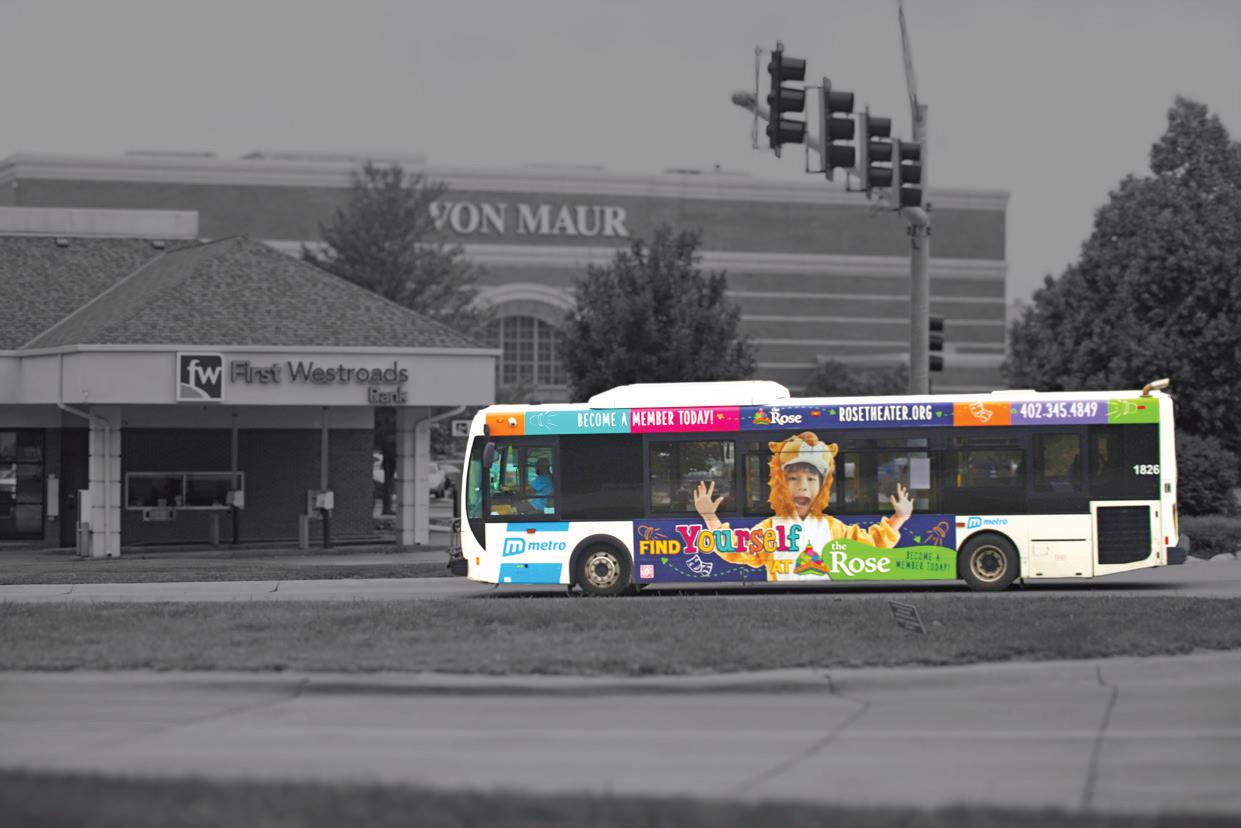

Now a board member of the College World Series of Omaha, Davies worked on the deal to extend the College World Series’ tenure in Omaha. While at Koley Jessen, a local law firm, Davies helped negotiate the deal among the city of Omaha, the NCAA, CWS Omaha, and the Metropolitan Entertainment and Convention Authority, which operates the stadium where the annual tournament takes place.
“It was extremely exhausting and extremely intense. But it was so fun, so educational to see these titans of the NCAA and the city of Omaha and MECA and lots of the local contributors around the table hammering out this gigantic deal,” Davies said. “That was…really fun.”
Alongside her high-powered role, Davies maintains a deliberately balanced life. A couple years at a law firm in the Cayman Islands taught her the benefits of living slowly. Davies and her husband, Drew, prioritize quality over quantity in everything they do.
“Our kids live in our lives, we don’t live in their lives,” Davies said of her family’s approach to balance. “My husband and I have full-time jobs that are very demanding. They are part of our identities and we care about them. Our children are involved in things, but we try to carefully select how much they participate in so there is balance. We have dinner together almost every night. We have downtime on weekends. We have rest.”




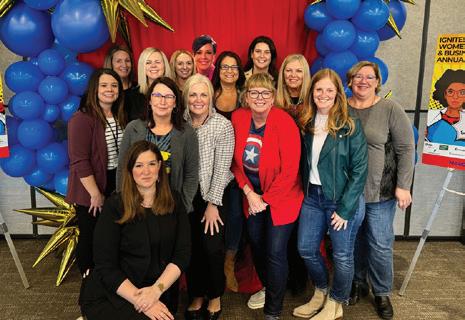



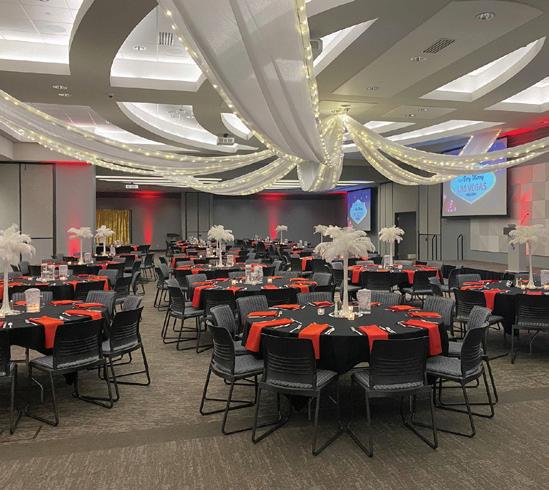


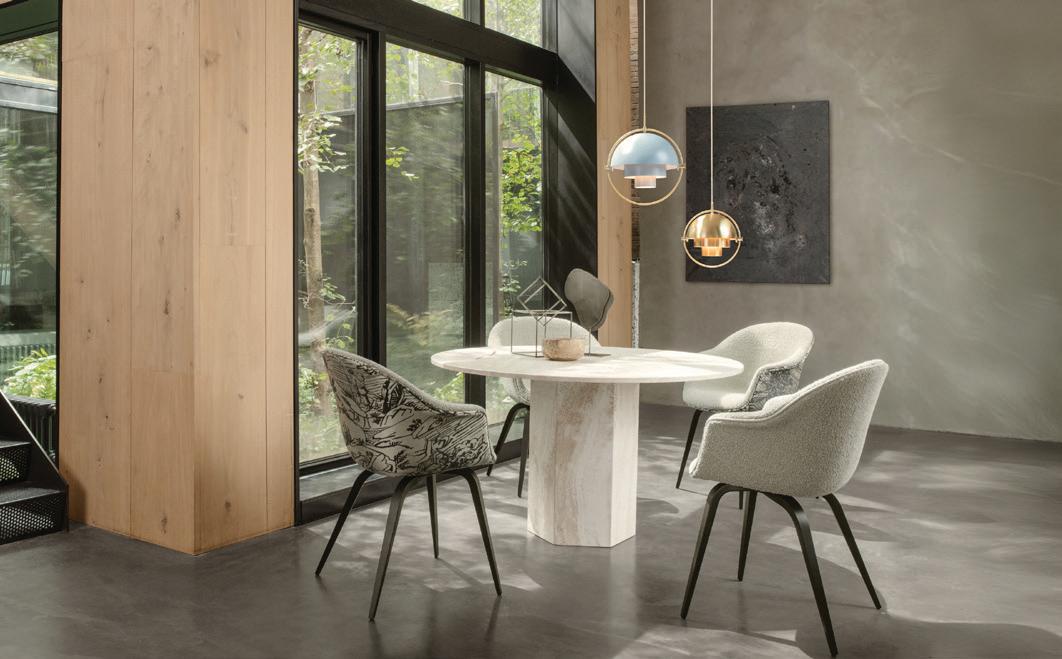



“WE’RE
A COMPANY THAT WANTS TO DO THINGS RIGHT.”
-ELISA DAVIES
This philosophy manifests in family traditions, which includes regular travel and the Davies family’s annual Halloween art project, where all four family members collaborate on elaborate costume creations, complete with professional lighting, makeup, and photography.
“You have to be really deliberate about not subscribing to the expectations of the American rat race,” she said.
Her appetite for adventure hasn’t diminished with the rise of her executive responsibilities. Davies still sings at home, in the hallway, in her car and she is an avid sailor, scuba diver, photographer, coffee drinker, weight lifter, nature lover, and bird watcher.
When the family travels, they make a point of intentionally going completely off the grid “no cell phone tower for hundreds of miles” as often as possible. Experiences have included visits to Botswana and the Amazon rainforest.
In all her endeavors, Davies strives to create space for others to grow while remaining true to her pioneering roots. Whether in the boardroom or the Amazon rainforest, she continues to push boundaries with purpose, proving that effective leadership isn’t about choosing between being driven or being human it’s about embracing both.
“My career has been driven by curiosity and pursuit and open-heartedness and open-mindedness and problem solving,” Davies said. “Those elements that the pioneers needed to survive on the plains.”
For more information, visit hdrinc.com.
B2B


For all of your facility cleaning needs, Jani-King’s trained and dedicated franchisees deliver beyond expectations. It’s all of the efforts behind the scenes that prepare you for success.


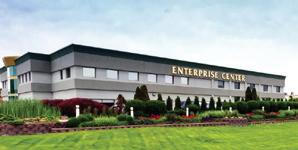










“IT’S FOR HIGH NET WORTH INDIVIDUALS WHO WANT TO DIVERSIFY INTO COMMERCIAL REAL ESTATE BUT DON’T NECESSARILY WANT TO BUY THEIR OWN PROPERTY.”
-Geoff McGregor
The way Geoff McGregor talks about commercial real estate investments is akin to the way Wolfgang Amadeus Mozart must have talked about classical music or Pablo Picasso about neoclassical art he’s extremely passionate. As the president and CEO of McGregor Interests, Inc., McGregor has continued to grow a successful family business that started in 1978 with his father, LeGrande McGregor.
But for the ordinary layman, he might as well be speaking a foreign language. Thankfully, McGregor has so much experience that he’s able to effortlessly summarize exactly what McGregor Interests does.
“We structure partnerships and raise capital from private investors to invest in commercial real estate,” McGregor explained. “Then we provide a return to those partners. We manage the property and provide a return to them.”
He continued, “We only do it for accredited investors, which basically means people that have a net worth above a million dollars, or income above $200,000 a year. It’s for high net worth individuals who want to diversify into commercial real estate but don’t necessarily want to buy their own property.”
An Eagle Scout and graduate of the University of Nebraska at Omaha, McGregor seemed destined to step into his father’s shoes.
“I started mowing lawns for the properties that my dad had put together back when I was in high school at Burke, and then continued that into college, and then moved over to some of the property maintenance and management things in college,” he said. “I realized after doing some underwriting on properties, I’m like, ‘Oh, this looks like a really interesting line of work.’ I
really developed a passion for it in college in the underwriting standpoint of it. Luckily, I was blessed to have a dad who could say, ‘here’s exactly how to do it.’”
While completing his degree in business administration real estate land use economics, McGregor expanded the company’s business to include the acquisition and remodeling of single family homes while obtaining his certified commercial investment member (CCIM) designation. With broker’s licenses in Nebraska, Iowa, Kansas, and Missouri, he’s able to use his expertise in real estate syndications, partnerships, lease negotiations, construction management, and investment analysis across the Midwest. It’s work McGregor says he finds “really fascinating.”
He continued, “I love seeing it through to the very end. Sometimes it takes 15 years or 22 years to get there, and so it’s just interesting to stick with it.”
Subsequently, the business has witnessed significant growth since he officially took the reins as president of the company in 2017. What makes McGregor Interests more attractive to potential commercial real estate owners is the low financial risk involved.
“The beauty of investing with us is you get to be diversified in commercial real estate for a minimal amount of money,” he said. “Usually our minimum investment size is around $100,000. And the good news is that’s all you can lose.
“Let’s say everything went south, the most you would lose is $100,000. Whereas if you went and did an investment on your own, you’re usually having to utilize leverage or borrow money from a bank, and if the real estate investment went south, you might have a loan for several million dollars that you’re still liable for.”
One of McGregor Interests’ main focuses is its Lockbox Storage expansion; there are dozens in its portfolio.
“When I started, I gravitated toward self-storage,” he said. “My dad always had one or two self-storage properties throughout his career but never more than two at any given time. I really liked it and we watched how those assets held up during the recession in 2008. It was our best performing asset type that year.”
He continued, “When the housing market crashed, I thought it seemed like a really fun investment, really stable and easy to predict cash flows. I could wrap my mind around how to predict the cash flows for it.”
In 2011, McGregor Interests saw the highest sales per square foot of any storage facility in Nebraska with the sale of Cornerstone Storage, which was sold for approximately $40 per square foot.
“I said, ‘Well, that was fun,’” he said with a laugh. “‘We should buy another one!’ So I found one in Blue Springs, Missouri. It was a mismanaged property called Lockbox Storage and we bought it. Everybody told us we should change the name because it had such a stigma for being mismanaged, but we really liked the name. We decided we’d keep it and just change the management. It was, like, 40 percent occupied when we bought it. We increased rents and added on to the facility and got it in the upper 90s for occupancy, which is stabilized.”

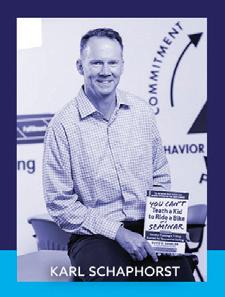



FROM PAGE 17
“SOONER
IS BETTER THAN LATER, MORE IS BETTER THAN LESS, AND ALWAYS TAKE THE LEAST WORST ALTERNATIVE. EVERY BUSINESS DECISION RUNS THROUGH THAT CHECKBOOK.”
-GEOFF Mc GREGOR
With that kind of success, McGregor kept adding more to the company’s portfolio and now, Lockbox Storage makes up a good chunk of business. In fact, the company surpassed its 2011 state record in 2016 with the multimillion dollar sale of Storage Mart at $76 per square foot the new state record.

MEETINGS CHANGE THE WORLD. WE’RE READY WHEN YOU ARE.
a global powerhouse in meetings and events www.planitincevents.com




McGregor’s father, who suffered a brain bleed shortly before his retirement, is now 80 and in good health. McGregor still turns to him for advice, and has committed a few words of wisdom from his father to memory.
“There’re a couple things I always remember my dad saying,” he said. “Sooner is better than later, more is better than less, and always take the least worst alternative. Every business decision runs through that checkbook.”
In terms of the future, McGregor envisions nothing but promise.
“I see continued growth in our Lockbox Storage portfolio, as well as continued growth in our multi-tenant industrial and retail portfolio,” he said confidently. “There are 28 people on staff and I think that will also continue to grow. If somebody’s interested in investing in commercial real estate, we’re a really great local source to do that with.”
Visit mcgregorint.com for more information.
B2B
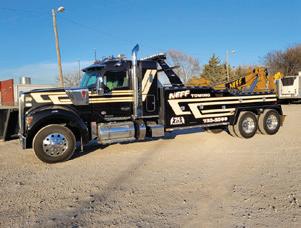
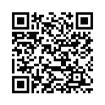

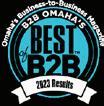







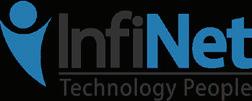
In a world where digital media is evolving faster than ever, Matt Tompkins has successfully leveraged his background in radio to build a thriving podcasting and marketing business. As the founder of Two Brothers Creative, a podcasting and marketing company, Tompkins helps clients create engaging podcasts an industry he believes holds tremendous potential, despite early skepticism.
Before venturing into the world of podcasting, Tompkins had a career in radio. The story of Two Brothers Creative begins with a moment of rejection at a radio station. Tompkins had proposed a business model centered around podcasting. His vision was to use the tools of the digital age to create highly specialized, niche content something he believed the radio industry could benefit from. However, his ideas were met with resistance.
“The general manager dismissed it, saying, ‘People make pennies off podcasts, and there’s no future in them,’” Tompkins recalled. The radio industry at the time, he argued, was struggling to adapt to the changing media landscape. “The failure of the radio industry to evolve into the digital age, with consolidation and syndication, led to a disconnection from local communities. It became clear to me that radio wasn’t going to change, and that opened up opportunities for podcasting.”
This experience proved to be a pivotal one. Radio, once a successful platform due to its local and specific content, had become increasingly corporate and generic. Podcasters, on the other hand, had the opportunity to engage with niche audiences and build communities based on shared interests. This insight ultimately led to the creation of Two Brothers Creative.
As Tompkins reflects on the state of podcasting today, one of the key observations he has made is how many podcasts fall short of expectations. He noted that a significant number fail to make it past their seventh to tenth episode. Why? Tompkins points to one common mistake: a lack of proper development upfront.
“Before launching a podcast, it’s critical to define your target audience,” he emphasized. “Who are they, and why should they listen to you? What value are you offering? If you don’t take the time to understand these fundamental aspects, your podcast will likely struggle to connect with listeners.”
At Two Brothers Creative, Tompkins and his team make it a mandatory part of their process to work with clients on these foundational questions. Skipping this development phase, he believes, leads to missed opportunities and ultimately results in a podcast that fails to resonate with its intended audience.
“Podcasting is an intimate medium. You’re literally talking to someone’s head, and if you don’t know what you’re offering, it’s difficult to build that connection. It’s like any relationship you have to understand yourself and your audience first,” he explained. Tompkins compared this to a person trying to form a meaningful connection without first knowing who they are or what they stand for.
He also pointed out a common misconception many aspiring podcasters have. “A lot of people think they’ll become famous overnight…They expect instant success and are disappointed when they see their download numbers stagnate. The reality is, podcasting is a lot of work, and it’s an ongoing process. If you commit to doing the foundational work and focus on your audience, you’ll see the results over time.”
One of Tompkins’ key pieces of advice for anyone looking to start a podcast whether for business or entertainment is to treat it like a business. While many people see podcasts as a hobby or side project, Tompkins believes that to succeed, podcasts should follow the same business principles as any other entrepreneurial venture.
“The first step is to treat your podcast like a brand,” he said. “Even if it’s entertainment-based, you need to know who your ideal listener is, why they should listen, and what value you’re providing them.” He stressed that successful podcasts, especially business podcasts, are built on a clear brand strategy and purpose. Without a clear understanding of your audience and what you bring to the table, it’s easy for your podcast to get lost in the digital noise.
In today’s content-driven world, where AI can generate endless material, human connection remains the key differentiator in podcasting. “AI can write content all day long, but it can’t make people feel something. That emotional resonance is something only human creators can provide. If you can connect with your audience emotionally and authentically, that’s what sets your podcast apart.”
Tompkins emphasized that podcast creators should always keep their ideal listener in mind when making decisions about content, guests, or even promotional strategies. He recommends visualizing the ideal listener not just in demographic terms, but in a more personal, almost intimate way. “Think about their age, their interests, and even their hopes and fears. Understand who they are, and everything you create should be designed to resonate with that person,” he said.

“IT
BECAME CLEAR TO ME THAT RADIO WASN’T GOING TO CHANGE, AND THAT OPENED UP OPPORTUNITIES FOR PODCASTING.”
-Matt Tompkins

A common mistake among podcasters is focusing too heavily on download numbers. While it’s natural to want to see high download counts, Tompkins believes that the true measure of a podcast’s success lies in engagement and specifically, the consumption rate.
“Platforms like Apple and Spotify use consumption rate as their primary metric. It’s not about how many people download your episode it’s about how much of each episode they actually listen to,” Tompkins explained. “Too often, podcasters focus on the number of downloads, but that’s not a true reflection of how engaged your audience is. You could have thousands of downloads, but if people are only listening to 10% of your episode, it’s a sign that your content isn’t connecting.”
Tompkins compared downloads to a personal benchmark, like a bench press. “The number of downloads is like how much you can bench only you care about it. No one else really does. Instead, focus on the content. If people are listening to 80% or more of your episodes, that’s a true sign that your podcast is resonating with your audience.”
For podcasters looking to monetize their content through ads or sponsorships, Tompkins advised against focusing too heavily on download numbers. “Only about 3% of podcasts make money through sponsorships. The bigger opportunity is in creating content that your audience values and that resonates deeply. That’s what will keep them coming back.”
Another key takeaway from Tompkins’ experience is the importance of focusing on one platform or strategy at a time. While many podcasters spread themselves thin by promoting their show on multiple platforms, Tompkins argues that the key to success is doing one thing exceptionally well.
“THE REALITY IS, PODCASTING IS A LOT OF WORK, AND IT’S AN ONGOING PROCESS. IF YOU COMMIT TO DOING THE FOUNDATIONAL WORK AND FOCUS ON YOUR AUDIENCE, YOU’LL SEE THE RESULTS OVER TIME.”
-MATT TOMPKINS
“Don’t try to be everywhere,” he advised. “Pick one platform and master it. For example, if you’re just starting out, focus on creating great content for your podcast and promoting it through one social channel. Don’t feel like you need to be on Instagram, TikTok, Twitter, and Facebook all at once. Instead, really hone in on one channel and do it better than anyone else.”
Tompkins believes that quality always trumps quantity when it comes to building a podcast brand. “Consistency and focus are more important than trying to juggle multiple platforms and diluted efforts,” he said. “If you do one thing well, it’ll pay off in the long run.”
Tompkins’ insights into the world of podcasting and digital media come from years of experience navigating both the radio industry and the growing podcasting space. While the radio industry may have missed the opportunity to evolve, Tompkins sees podcasting as a medium that is only continuing to grow. But for anyone looking to succeed in the podcasting world especially those building business podcasts his advice is clear: take the time to define the audience, treat the podcast like a business, and focus on creating content that resonates emotionally with listeners. Through thoughtful development, authentic storytelling, and strategic focus, any podcaster can turn their vision into a thriving and successful endeavor.
Visit twobrotherscreative.com for more information. B2B
Since 1917, five generations of the Walker family have served the retail, and then the commercial, laundry markets in Omaha and the surrounding areas. We’re Dry Cleaners, but many Omaha business owners have also depended on our Uniform Rental Service since 1974.
www.maxiwalker.com & www.maxiwalkeruniform.com
B2B_Jan_2025.qxp_Layout 1 12/18/24 9:40 AM Page 1
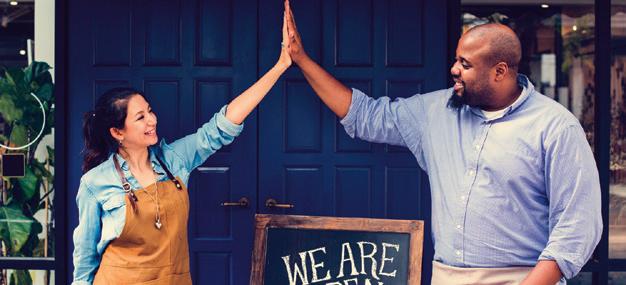

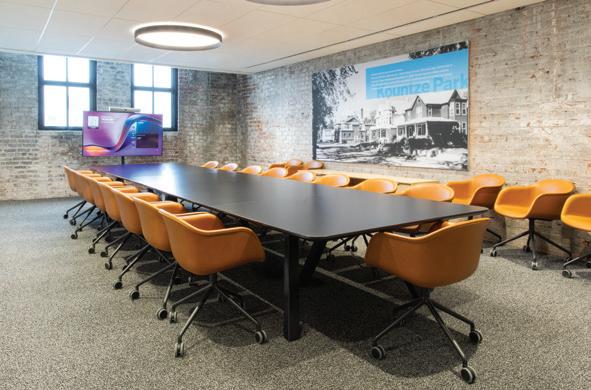

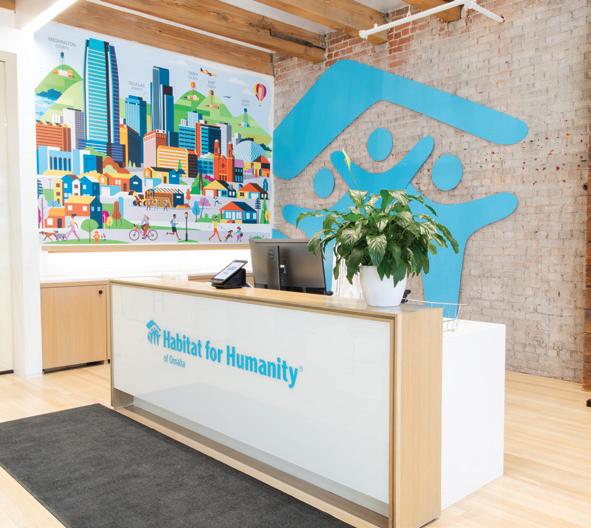

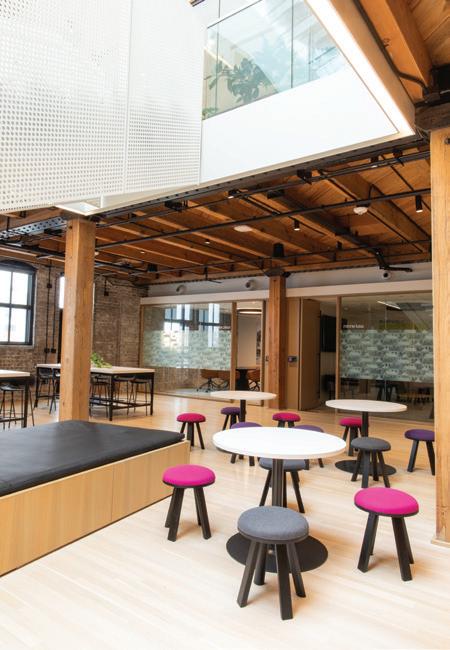
The former Habitat for Humanity Omaha headquarters at north 24th St. seemed like a maze. Employees navigated tight turns around cubicles and card tables, hoping to find a quiet meeting corner. Restrooms were converted to meeting spaces, utilizing each square inch, but the office felt claustrophobic, ineffective, and inhospitable.
Chief executive officer Amanda Brewer desired more for her staff of over 90 employees. Expansion wouldn’t work since the cost seemed more like an expensive band-aid, so the board advised seeking out empty spaces.
Lacey Studnicka, the chief program officer, toured the Ashton in Millwork Commons, which welcomed her with a timeless brick façade on the exterior. After walking through empty rooms on the second floor, Studnicka couldn’t visualize the end goal for the nonprofit until the broker showed her a completed look one level up. She saw a bright blue bookshelf, ironically one of Habitat’s colors, and knew it fit the positive vibes of their brand. Habitat offers homeownership and educational opportunities for families in need.
“(Families) are all working hard to make their dreams happen,” Studnicka said. “This space matches that energy.”
The third floor’s 2,300 square feet doubles the room from the previous building that still houses construction warehouse production. Flywheel sold their company to WP Engine, leaving behind a completed design by Alley Poyner Macchietto Architecture, who formed a warm and hospitable environment. Clark Creative Group added branding such as a flashy neon sign in cool blue tones that says, “It Takes All of Us,” but the nonprofit preferred to keep most of the changes to a minimum since the original aesthetic blended naturally with their altruistic ambiance.
“When people come to Habitat, they can have the courage to hope,” Brewer mentioned. “And this space re-enforces that. It’s bright, it’s beautiful…and it elevates our employees and homeowner partners.”
Colorful art of the city greets guests, a “where they build” county guide with vibrant images of neighborhoods in the city. Blonde wood floors pair with gray brick and wooden ceiling beams to create a sense of serenity. Collaboration spots can now occur on relaxed navy couches or mustard chairs under soft LED lights instead of the hallways, while a white noise system ensures privacy. Meeting room names come from neighborhoods like historic Benson. Personnel can take advantage of other businesses in the building like Archetype Coffee, which they can enjoy on the patio.
“Staff comes from a place where we were so industrial and scrappy to a high-tech, decorated, higher-end one. You feel proud,” said Studnicka, whose department once worked out of a converted restroom.
Brewer recalled a Nepalese family sitting around one of the smaller tables to sign a purchase agreement with their shoes off, a cultural tradition.
“I felt so happy that the space afforded them that level of comfort,” Brewer added.
Plus, the additional room allows for gatherings such as nonprofit get-togethers and strategy sessions. Habitat even hosted a longtime volunteer celebration of life that shows “how meaningful the work is,” according to Brewer. The bookcase now displays lively photos of families and volunteers.
The connectivity also rests in the wood, the beams, and the brick because the building used to house the Millwork factory that once made the crown molding and trim for Habitat.
“It marries the past, the present, and the future work that happens here. I love it,” Brewer added.
Visit habitat.org for more information.
I n May 2008, Lisa Harte took a leap of faith that would reshape her career and carve out a space for herself in the male-dominated freight logistics industry. With two decades of experience, she founded Advantage Logistics, a woman-owned brokerage specializing in heavy-duty equipment and less-than-truckload (LTL) freight.
Harte’s path to entrepreneurship began with a parttime job at a smaller company, where her growing passion and confidence in her abilities inspired her to branch out on her own.
“I had no idea where it would take me, but I knew that I could talk to people,” Harte said. “I knew that I could do some good in the business.”
Her personal touch and entrepreneurial grit have set Advantage Logistics apart. Harte operates independently, without the pressure to meet strict bottom-line goals like larger firms. Freight brokering, she explained, requires strong communication with clients to build a base for moving freight to carriers.
“I’m still just a one-person show who has some help in the background with bookwork, but I do it all,” she shared. “I don’t want clients to have to talk to anybody but me. It’s been a good choice.”
Her approach allows her to maintain direct, personal contact with each client regardless of the volume of freight she’s handling. Harte’s success has grown entirely through word-of-mouth referrals, starting with a single loyal customer who remains with her 16 years later and expanding to a roster of about 40 major clients today.
Mike Kranz of Waste Connections Inc., one of Advantage Logistics’ long-standing clients, relies on the company to handle complex logistics, including transporting equipment like metal dumpsters and large four-axle trucks.
“Frankly, we couldn’t get this completed without our relationship with (Harte),” Kranz said. “She makes things so easy; after one email or call, she takes control, and I don’t have to worry about it anymore.”
“I know when I call Lisa that she’s going to check all the boxes: the best rate, clear communication, and an ETA you can bank on. Full truck or LTL, she’s my first choice,” said Lawrence Hale Jr. of Beacon Building Products, another of Advantage Logistics’ trusted clients.
Harte attributes much of her success to her personable approach treating clients and carriers as individuals she genuinely cares about. She emphasizes that while kindness is her default approach, being firm with certain carriers is sometimes necessary to maintain professional standards.
“This industry has always been male-dominated, especially at the time I started, so I did have to toughen up a bit,” she explained. “Still, I talk to them like they’re my friends, and they are we’re a big family.”
Her ability to balance fairness between clients and carriers has been key to her success. “‘Keep up the good work,’ I tell my drivers. ‘Bless you. Be safe on this trip.’ I just think that’s important,” Harte said.
Today, Harte remains focused on maintaining highquality service for her clients. She envisions hiring
“FRANKLY,
WE COULDN’T GET THIS COMPLETED WITHOUT OUR RELATIONSHIP WITH (HARTE). SHE MAKES THINGS SO EASY; AFTER ONE EMAIL OR CALL, SHE TAKES CONTROL, AND I DON’T HAVE TO WORRY ABOUT IT ANYMORE.”
-MIKE KRANZ
more employees as a potential next step to expand her customer base without compromising personal attention. Yet, she is content with staying busy and fully engaged in her work throughout the day.
Harte describes the freight industry as increasingly challenging due to economic pressures and reduced freight demand. Still, her priority is ensuring her clients receive the best service possible.
“I want people to feel like they got everything out of these services that they needed,” she said. “They know they can come to me with any load, and I will do everything I can to handle it.”
Harte noted that with determination, success is always within reach.
“I’ve hit some roadblocks, but industries are always evolving no matter what you’re doing,” she said. “You can learn from your mistakes, and you can try again.”
For more information, visit advanlogistics.net.
“I’M STILL JUST A ONE-PERSON SHOW WHO HAS SOME HELP IN THE BACKGROUND WITH BOOKWORK, BUT I DO IT ALL.”
-Lisa Harte
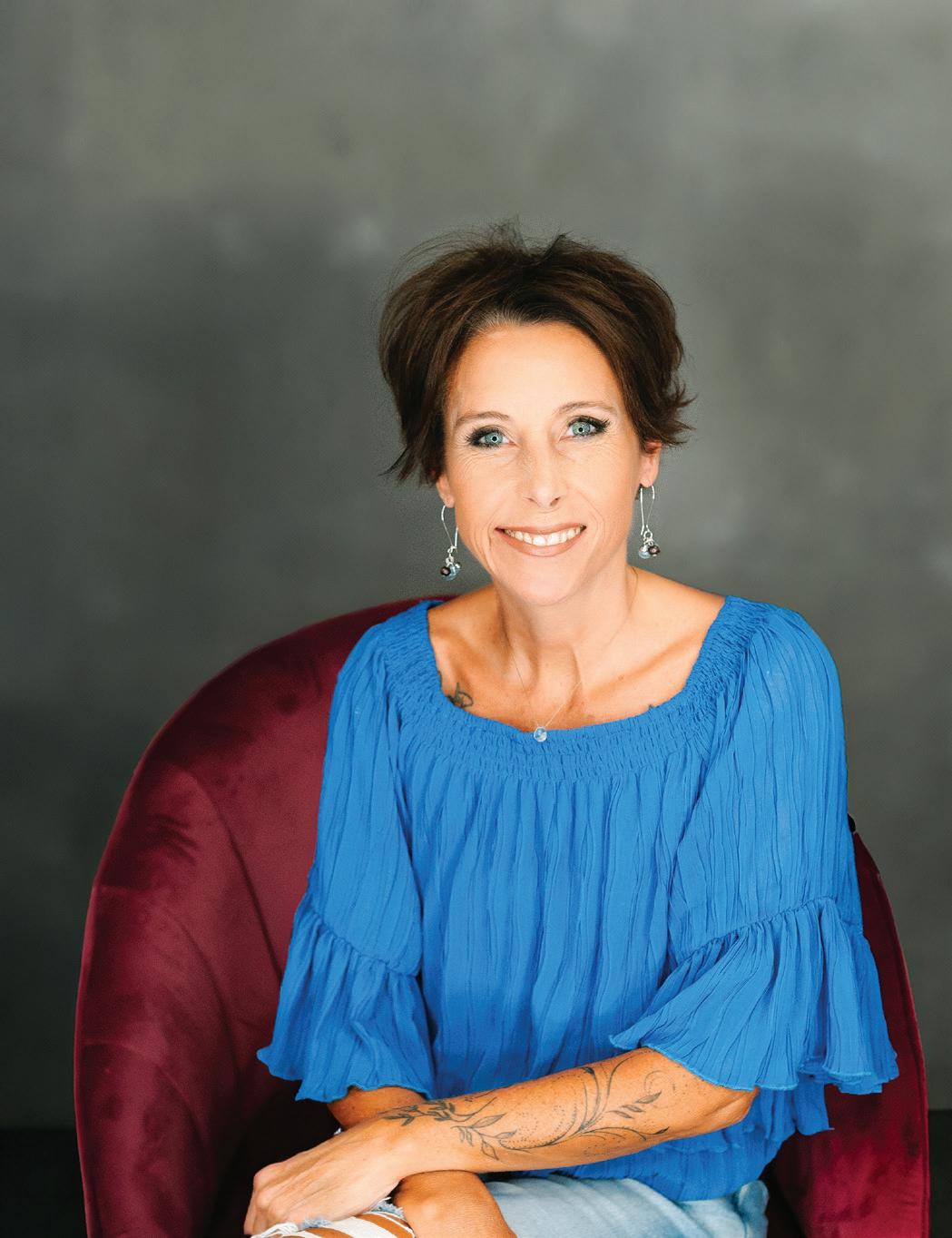
“MOST
OF US WERE RAISED IN AN ENVIRONMENT WHERE (TALKING ABOUT MONEY) IS TABOO. BOYS ARE ENCOURAGED TO INVEST, WOMEN ARE TAUGHT TO MANAGE.”
-Megan Hale

| STORY BY DAISY HUTZELL-RODMAN | PHOTO BY SARAH LEMKE
Megan Hale knew what she wanted to do for a living at age 15.
“I was lucky in the sense that, when I was 15 years old and in my first psychology class, I was enamored with humans and how we can live happier, healthier lives,” she said.
The young woman obtained a master’s degree in psychology and, at age 29, opened a private practice. That’s when she realized that there was a lot of freedom and creativity in owning a business.
Her husband, Breck, was serving in the military at that time, negating Hale’s ability to open a practice and run it for years on end. She and Breck moved about every three years, and Hale opened and closed practices as Breck was stationed in different locales.
By 2015, Hale wasn’t interested in opening and closing practices anymore. She left the profession she pursued since her teenage years and moved into the world of life coaching, using her skills as a therapist to help businesspeople craft the lives they wanted.
“My colleagues thought I had lost my mind,” Hale said. She started working with entrepreneurs and saw some business growth, but the young woman was also a new mom, and she wasn’t making as much as she wanted or needed.
She created a method of making money, one that changed her trajectory. She dove deep into how much she needed to earn in cash to be financially stable, created calculators, then created more tools to figure out how much she needed to fund her dreams.
The data enabled her to create sustainable revenue planning tools, and in four weeks, she built and sold that program in 2018 for $60,000, three days before she birthed her second baby.
“I’d never made more than $50k a year by that point,” Hale said of the sale that shifted her from working the daily grind to having money in the bank.
The program is the Dream Money Method. While there are plenty of programs that talk about how to crunch numbers and make money, Hale’s program comes from the psychology angle of trying to overcome financial mindset barriers, focusing on reducing emotional money barriers as well as those barriers specific to women.
“Most of us were raised in an environment where (talking about money) is taboo,” Hale said. “Boys are encouraged to invest, women are taught to manage.”
In fact, the Dream Money program includes a month of diving into an entrepreneur’s generational money story and looks at one’s beliefs about money.
By 2020, she had tripled her revenue with this program, and by 2021 she had a multiple six-figure launch. But Hale was already thinking bigger.
In 2022, she hired a team and started offering even more services while looking toward technology to help her grow. The Dream Money Method lead to the Dream Money App, which she couldn’t have done without the help of technology firm Coura. She began working with this Boston group, but discovered a small wrinkle when applying for a Nebraska Innovation grant. The grant required the work to be done in Nebraska.
The group in Boston decided to stick by Hale.
“We ourselves have been expanding really quickly as a business, so we realized if we wanted to continue this relationship, maybe we should get an office in Nebraska,” said Caroline Lopez, chief operating officer of Coura.
Through Hale, the technology firm itself began to think about how it handled money differently.
“One thing we’ve learned just in working with Megan is about setting aside 15 percent of your monthly revenue for taxes,” Lopez said. “We previously had a large tax bill we had to pay in April. Now, since we’re setting aside 15 percent each month, we feel more capable and ready to pay. Just having that allocation set aside has been a game changer for us.”
This spring, Hale is poised to help anyone around the world. In November 2024, she received a $75,000 Nebraska Innovation Fund Prototype Grant, and she’s on track to launch a fintech company in 2025.
Visit meganhale.co for more information.
B2B
Some businesspeople find a hobby of model railroads hits the spot; for others, it’s knitting. Some people collect rare, cult films and memorabilia.
And then there are people like Kurtis Kammerer, vice president of sales strategy for Supportworks. Kammerer is a guy who takes his passion for cars to fast and furious extremes.
While most people are drawn to what’s new, what’s shiny, what’s now, Kammerer values age over flashy new bells and whistles.
“I’m 58 and so the kind of cars that I love the most are some of the ones that were around when I was a kid,” said Kammerer. “I’ve always had some sort of car, or dozen. There are my Hot Rods, my fun stuff; and so, I find that I can appreciate new cars, but I find them rather boring to just drive.”
One car that seems to get a lot of attention is the 1966 Ford Squire he will drive to the office. The Ford Squire might not seem like an executive vehicle; after all, station wagons are more often associated with running children to soccer practice. The Squire was a stalwart among wagons. They were first produced in 1950 and last produced in 1978 and are sometimes known as “woodies.” For the 1966, Ford reportedly standardized front and rear seat belts, gave the car a padded dashboard and sun visors, a deep-dish steering wheel, reinforced door latches, and emergency flash signals.
Kammerer regularly rotates the cars he has at home, as well as those at his shop, driving different cars to the office, at home, on the weekends.
For Kammerer, choosing a car to drive can affect his mood and routine for the entire day; just like how the clothes one chooses can set the perfect tone.
“You’re like, ‘Oh, do I want to wear jeans or pants; or do I want to wear these boots or these,’” Kammerer asserted. “Yes, that’s how I look at
my cars. It kind of defines my day. And I’m like, ‘Ya know what? It’s a convertible day! I want to get my old convertible out!’”
Kammerer’s explanation for choosing which vehicle he’ll drive, such as the much-ballyhooed ’66 Squire, may seem to the casual passerby as complex as a Facebook algorithm.
Yet, the simplicity of his response is as refreshing as it is, in hindsight, kind of obvious: The cars Kammerer chooses reflects his mood and routine for the day, like how the way one’s clothes can set the tone for how positive, or positively awful, the day may get.
Then again, who doesn’t like attracting a little attention, now and then? Well, for Kammerer, the attention, the stares, are nearly constant.
“It’s almost impossible for people ... to not come up to me and say, either ‘my parents had one of those when I was a kid, and we’d vacation,’ or ‘my friend’s parents, or my aunt or uncle [drove this car or that],” said an enthused Kammerer. “My wife loves to travel, and I love driving my old cars. So, we combine [the two], every year, for about 10 days, and road trip. As to where? We don’t really pick a route; we just head out.”
At the end of the road, Kammerer said, it’s less about visiting places unknown than it is about meeting faces unknown.
“If I pull up in a mid-’60s Mercedes or one of these wagons, or my old Corvettes, somebody’s going to come up, and want to talk about the car,” Kammerer said. “While some people would find that hugely annoying, I love meeting people!”
B2B

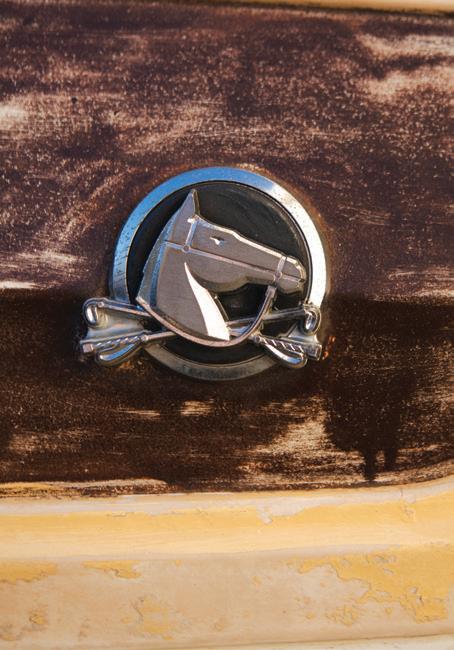
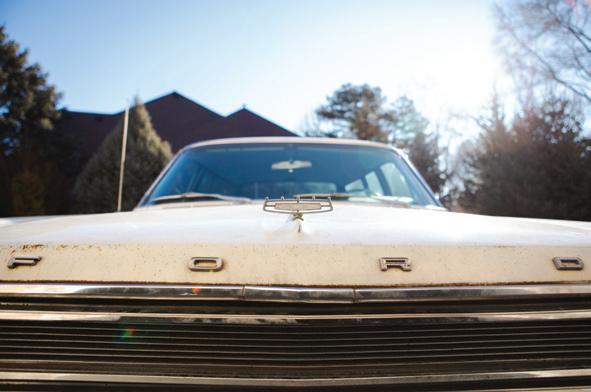
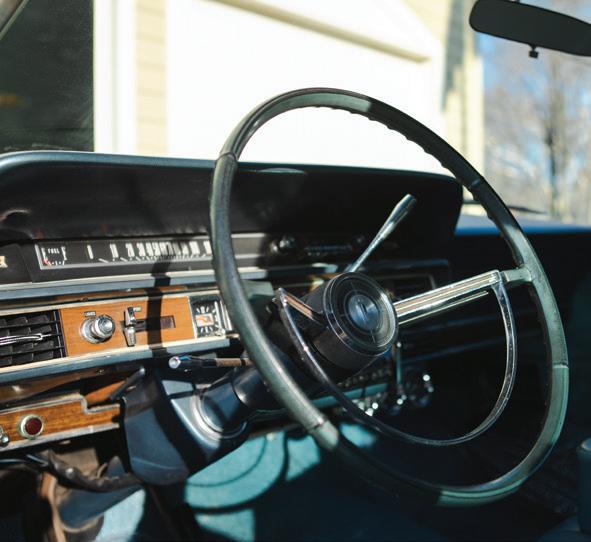
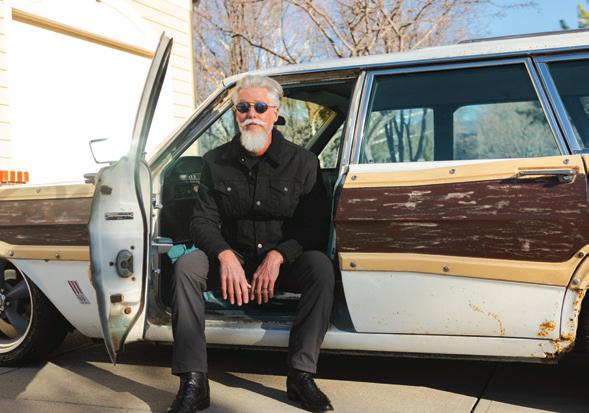
I t was another good year for Omaha tourism. While numbers were more measured than the explosive growth seen in 2022 and 2023, growth persisted in 2024. Trends indicate Omaha tourism for both leisure travel and group business (conventions, meetings, sporting events, and motor coach tours) will enjoy continued success in 2025.
As an affordable and convenient destination full of surprises, Omaha is uniquely positioned to meet leisure travelers’ shifting preferences namely, “JOMO” (the joy of missing out), and multigenerational travel. According to Expedia, 63% of travelers seek out less crowded destinations that offer authentic, stress-free experiences, valuing quality time with loved ones over packed itineraries.
The second trend is a surge in multigenerational travel. According to booking.com, Baby Boomers are ready to take trips, and cover costs for children and grandchildren to come along. This generosity will spread the joy of travel through the generations.
Group business in Omaha reached full recovery in 2023, and the future looks bright. According to Tourism Economics, an independent research
firm, group business is expected to surge in 2025. Meeting professionals are also feeling optimistic, according to a recent Amex Global Business Travel survey. Many respondents are seeing an increase in budget, which they plan to allocate toward attendee engagement, sustainability, and new technology.
These projections for the new year bode well for Omaha. Omaha is a destination that balances excitement and relaxation, convenience, and affordability. With continued effort from the Visit Omaha team and tourism partners throughout the city, “JOMO” might become the abbreviation for another worthy concept the joy of meeting Omaha.
Find more information about tourism’s positive impact on Omaha atvisitomaha.com/wtll.
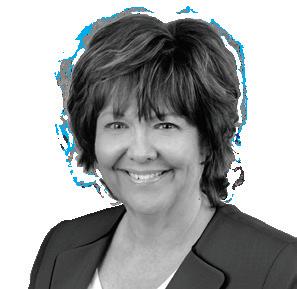
I n today’s competitive business landscape, growth is never a solo endeavor. Success thrives on collaboration, shared insights, and an unwavering commitment to continuous improvement. I am always inspired by how our community of professionals exemplifies the very essence of this principle.
The Greater Omaha Chamber represents more than 12,000 business professionals across 3,000 member businesses. This is more than a statistic, it is a testament to the strength in numbers. Together, we are the largest, most influential business network in the region. When you’re in any professional services sector, joining this community provides your business with unparalleled opportunities to learn, grow, and elevate your brand’s reputation.
The benefits of membership are widereaching, especially in today’s interconnected world. Chamber members see a 73% increase in consumer awareness compared to nonmembers. This is not just by chance; it is the result of being part of a trusted and respected network that fosters connections and visibility. By aligning your business with over 3,000 organizations, you enhance your reputation and visibility in the Greater Omaha business community.
Membership also opens doors to personal and professional development. As members, you and your employees gain access to exclusive events, industry councils, and programs designed to build expertise and foster growth. Whether it’s honing leadership skills through our Leadership Omaha program or attending webinars that address industry and workforce trends, our members are always equipped with the tools to stay ahead of the curve.
Additionally, chamber membership offers a unique opportunity to get involved in shaping the future of our
community. As a member, you can volunteer on one of our councils or committees, allowing you to directly influence Omaha in meaningful ways. Your voice, insights, and expertise matter, and through our collective efforts, we amplify the positive impact on the region’s economy and quality of life.
We understand that the strength of our membership lies in the power of our collective voice. We are passionate advocates for our business community, ensuring that when it comes to key issues, our members are informed and empowered to take action. Together, we work with lawmakers and local leaders to create an environment that supports businesses and spurs progress across all sectors.
As we look toward the future, we remain committed to driving economic growth in Omaha. Our focus on attracting new businesses, supporting existing ones, and developing new sites for industry ensures that every business in the Greater Omaha area can thrive. The chamber’s mission is to make our region one of the best places to live, work, and grow a business and we can only do this through the collective strength of our membership.
By joining the Greater Omaha Chamber, you’re joining a powerful community of professionals and businesses that are all committed to mutual success. Together, we can grow, innovate, and build a brighter future for Omaha. Let’s grow together.
For more information, visit omahachamber.org.


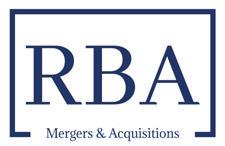
Results Business Advisors, the leading Nebraska business brokerage, is dedicated to facilitating seamless business acquisitions and sales. Our team of experienced business brokers recognizes that confidentiality is paramount, and we pride ourselves on setting the industry standard in safeguarding client information.
Results Business Advisors specializes in selling privately-held companies ranging from $1M-20M in value. We have a number of highly qualified business brokers with varied backgrounds in business. Our brokers have personally owned, managed, created and sold our own small businesses, which helps us understand both the needs and concerns of sellers & buyers of privatelyheld businesses. Whether you have an interest in buying or selling a business, we are here to help you realize a successful transaction.
At RBA, we treat every sale as more than a transaction - because it is.

E xceptional Reputation - Trusted by All
E stablished M&A Methodology
Transparent Process
Con f identiality Assured
E xpertise in Selling Busines ses Val u ed under $50M
M aximizing Net Proceeds for B u si n ess Owners

With our local Pella Omaha experts by your side, you can be sure you’re getting the exact windows and doors to fit your style and budget. Start your project today and you’ll be enjoying your new views in no time!

Spring Into Action -- Schedule your free consultation today! Stop by our showroom at 14478 Crest Road, Omaha, NE 68138, visit our website www.pellaomaha.com or call us at 402-331-9225.